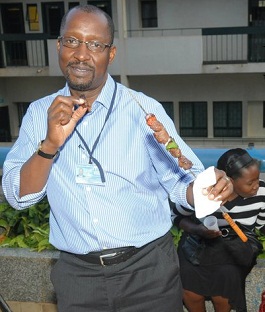
The Inspector General of Government has commenced investigations into alleged corruption at the National Social Security Fund.
In a 27 June letter to the NSSF managing director Richard Byarugaba, the IGG states that the purpose of the communication is to introduce two investigating officers “who have been authorised to conduct the investigations and obtain relevant information/documents”.
It is the fifth time NSSF, valued at over Shs7 trillion, comes under the spotlight. At the heart of the investigation is a whistleblower’s dossier which alleges that Mr Byarugaba hiked the cost of Pension Towers to Shs227 billion from Shs181.5 billion. The cost had been slashed by Geraldine Ssali Busulwa in December 2014, as acting MD at the time.
The whistleblower goes on to allege that the increment, upon Mr Byarugaba’s return from leave “was for his personal gain as well as that of his brokers”. The IGG’s office received the whistleblower’s document on May 5, 2016, according to a copy seen by this newspaper.
Construction on the towers, located on Lumumba Avenue, was suspended after its retainer wall caved in claiming nine lives in 2008.
Another allegation leveled against NSSF management and to be investigated is that Mr Byarugaba is given a monthly commission as a percentage of fixed deposits that the Fund places in commercial banks. NSSF is also accused of “squandering workers’ savings on political misadventures” when elements including the Fund boss allegedly funded former premier Amama Mbabazi’s campaign for the presidency.
Proxy war?
The accusations against Mr Byarugaba come in the wake of an earlier whistleblower document in which an anonymous person, claiming to be an employee of NSSF, accused deputy MD, Mrs Ssali of being “incompetent” and “insubordinate”. The four page document, says in part “As a responsible staff member, I am required by the Fund’s Code of Ethics to bring to the attention of management the conduct and actions of Ssali that I consider unethical or unlawful conduct.”
They include alleged leaking of ‘vital information to the media on the running of the Fund, a thing, according to the whistleblower, that contravenes the ethical code required of all employees of the Fund. The same whistleblower also brings into question Mrs Ssali’s academic credentials, saying that she is not qualified for the position of deputy MD and that “she lied about her track record and experience.”
The enduring feud between Mr Byarugaba and Mrs Ssali climaxed when Ssali was denied access to her office on return from maternity leave. In a March meeting, NSSF’s Board of Directors resolved to suspend the deputy MD and commence inquiries into allegations of misconduct and gross insubordination.
Mrs Ssali challenged this in the High Court, where it was ruled that NSSF reinstates her. However, that court order was not complied with, leading her to sue NSSF again, this time for contempt of court. The High Court ruled in Mrs Ssali’s favour, and awarded her Shs200 million in compensation. She is back in office, although the Fund has since appealed that ruling.
NSSF responds
In a statement published on its website, NSSF pledged to co-operate with the IGG’s office. In the same statement, NSSF however denies any wrongdoing in its decisions involving placement of fixed deposits with commercial banks.
“The decision to invest money in fixed deposits with commercial banks is made in accordance with the Fund’s Investment Policy Guidelines approved by the Board and the Uganda Retirement Benefits Regulatory Authority.
“The Fund invests in commercial banks that meet Bank of Uganda minimum capital requirements and the Fund’s risk ratings. This process ensures that the Fund’s fixed deposits investments are transparent and not open to individual negotiations, manipulations and commissions of any sort.”
NSSF also explained the Pension Towers figure saying it was not arrived at by an individual manager or board member but rather scientifically determined by the project consultants based on technical requirements to complete the project and an independent market assessment.
The Fund’s management also denied the allegation of bankrolling certain political individuals or parties, labelling the allegations “incorrect and unfounded” adding “our books and accounts are open for inspection and verification by appropriate independent authorities.”
Poisoned chalice?
The feud is a continuation of what has been a common threat in NSSF since it was established in 1995 by an Act of Parliament to provide social security services to employees in in Uganda.
Its first chairman, Elly Karuhanga left a disgraced man after he irregularly procured for himself a sleek Mercedes Benz.
Abel Katembwe was retired in 1998 in public interest after a committee of Parliament on economy and parastatals recommended his sacking citing influence peddling.
In 2004 NSSF managing director Leonard Mpuuma was charged with accepting a bribe of Shs700m from James Isabirye, the director of Mugoya Estates. Mugoya Estates and NSSF were involved in a botched 400 unit housing venture in Nsimbe, Mpigi. The report noted at least seven allegations of corruption and mismanagement in the transaction between NSSF and Mugoya, including the loss of four billion shillings through over-valuation of 840 acres of land for the joint venture. It also pointed to a plan by NSSF officials to wrongfully lend five million dollars from NSSF to fund the joint venture.
Then there was David Chandi Jamwa who was accused of causing a Shs3 billion loss to the Fund following his decision to sell Treasury Bills before their date of maturity between September and November 2007. He was sentenced to 12 years in jail by the Anti-Corruption Court.